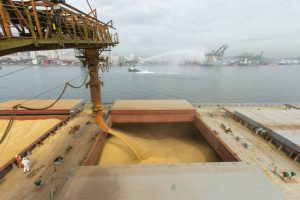Bloomberg: Russian oil product exports fell due to strikes on refineries

Shipments from Russian ports fell by about 300,000 barrels per day compared to the same months over the past three years.
Total flows of Russian oil products fell to 1.94 million bpd in the first 15 days of September, Bloomberg reported.
Analysts say that if the trend of declining exports continues, September will be the month with the lowest average at least since the beginning of Russia’s full-scale war against Ukraine.
“This also shows the real impact of Ukrainian drone attacks on Russia’s oil industry,” the report says.
In particular, according to estimates by JPMorgan Chase & Co., strikes on several large refineries have reduced the country’s refining rate below 5 million bpd, which is the lowest since April 2022. Combined with a previous seasonal increase in domestic consumption, the decline in production has led to a gasoline shortage. Officials are considering extending a ban on road fuel exports until October and are urging producers to redirect diesel to the domestic market.
Crude oil flows from Russia fell sharply the week before last, as supplies to the Baltic states were cut after Ukrainian drone attacks, according to tanker tracking data compiled by Bloomberg.
Diesel and gasoil exports fell 12% from the previous month to about 699,000 bpd. At the same time, supplies to Turkey remain strong, with significant cargoes being redirected from Brazil and Africa. Just 342,000 bpd of straight-run gasoline was exported, down 30% from a multi-month high in August and the lowest level this year.
Fuel oil flows, by contrast, rose to 835,000 bpd, the highest level since April 2023. The bulk of the cargo is headed to Asia, particularly India. Vacuum gas oil supplies fell to 53,000 b/d. Jet fuel exports were the lowest in a year, at less than 10,000 b/d.
At the same time, the publication noted that no gasoline and blendstock supplies were observed during the month. In general, fuel flows usually decrease in the fall during seasonal maintenance of refineries, when production drops and plants switch to winter production. This allows more winter fuel to be stored for the domestic market and leaves less for export.





